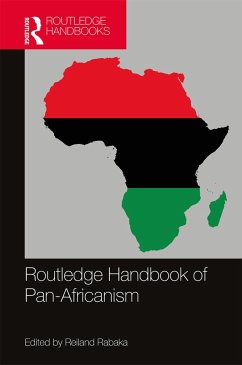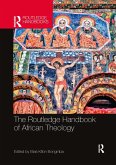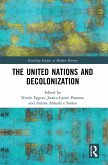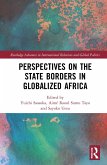The Routledge Handbook of Pan-Africanism provides an international, intersectional, and interdisciplinary overview of, and approach to, Pan-Africanism, making an invaluable contribution to the ongoing evolution of Pan-Africanism and demonstrating its continued significance in the 21st century.
The handbook features expert introductions to, and critical explorations of, the most important historic and current subjects, theories, and controversies of Pan-Africanism and the evolution of black internationalism. Pan-Africanism is explored and critically engaged from different disciplinary points of view, emphasizing the multiplicity of perspectives and foregrounding an intersectional approach. The contributors provide erudite discussions of black internationalism, black feminism, African feminism, and queer Pan-Africanism alongside surveys of black nationalism, black consciousness, and Caribbean Pan-Africanism. Chapters on neo-colonialism, decolonization, and Africanization give way to chapters on African social movements, the African Union, and the African Renaissance. Pan-African aesthetics are probed via literature and music, illustrating the black internationalist impulse in myriad continental and diasporan artists' work.
Including 36 chapters by acclaimed established and emerging scholars, the handbook is organized into seven parts, each centered around a comprehensive theme:
Intellectual origins, historical evolution, and radical politics of Pan-Africanism
Pan-Africanist theories
Pan-Africanism in the African diaspora
Pan-Africanism in Africa
Literary Pan-Africanism
Musical Pan-Africanism
The contemporary and continued relevance of Pan-Africanism in the 21st century
The Routledge Handbook of Pan-Africanism is an indispensable source for scholars and students with research interests in continental and diasporan African history, sociology, politics, economics, and aesthetics. It will also be a very valuable resource for those working in interdisciplinary fields, such as African studies, African American studies, Caribbean studies, decolonial studies, postcolonial studies, women and gender studies, and queer studies.
The handbook features expert introductions to, and critical explorations of, the most important historic and current subjects, theories, and controversies of Pan-Africanism and the evolution of black internationalism. Pan-Africanism is explored and critically engaged from different disciplinary points of view, emphasizing the multiplicity of perspectives and foregrounding an intersectional approach. The contributors provide erudite discussions of black internationalism, black feminism, African feminism, and queer Pan-Africanism alongside surveys of black nationalism, black consciousness, and Caribbean Pan-Africanism. Chapters on neo-colonialism, decolonization, and Africanization give way to chapters on African social movements, the African Union, and the African Renaissance. Pan-African aesthetics are probed via literature and music, illustrating the black internationalist impulse in myriad continental and diasporan artists' work.
Including 36 chapters by acclaimed established and emerging scholars, the handbook is organized into seven parts, each centered around a comprehensive theme:
Intellectual origins, historical evolution, and radical politics of Pan-Africanism
Pan-Africanist theories
Pan-Africanism in the African diaspora
Pan-Africanism in Africa
Literary Pan-Africanism
Musical Pan-Africanism
The contemporary and continued relevance of Pan-Africanism in the 21st century
The Routledge Handbook of Pan-Africanism is an indispensable source for scholars and students with research interests in continental and diasporan African history, sociology, politics, economics, and aesthetics. It will also be a very valuable resource for those working in interdisciplinary fields, such as African studies, African American studies, Caribbean studies, decolonial studies, postcolonial studies, women and gender studies, and queer studies.
"Edited by Rabaka (Univ. of Colorado, Boulder), this scholarly handbook provides a dynamic view of Pan-Africanism by exploring the Pan-African idea, movement, and its scholarship from international, intersectional, and interdisciplinary perspectives. Divided into seven parts, this reference offers researchers a complete and current overview of the origins, theories, literature, philosophical, and artistic influences that have shaped Pan-Africanism, focusing on both continental and diaspora African cultures, history, economics, and political and social movements. The handbook's 36 chapters, authored by expert and emerging scholars in the field, offer researchers an impressive range of scholarly yet accessible introductions to current and historic topics that include "African Feminism," "LGBTQI+ People in Africa," "Hip Hop and Pan-Africanism," "The politics of Pan Africanism," and decolonization, among others. The handbook's detailed coverage will provide undergraduates, graduate students, and researchers with a welcome array of scholarly voices to explain the evolution, importance, and future of Pan-Africanism. This text will be a valuable addition to any academic library collection supporting such disciplines as African, African American, and Caribbean studies; history; literature; music; political science; queer studies; and women and gender studies." --L. Lampert, California State University--Northridge








